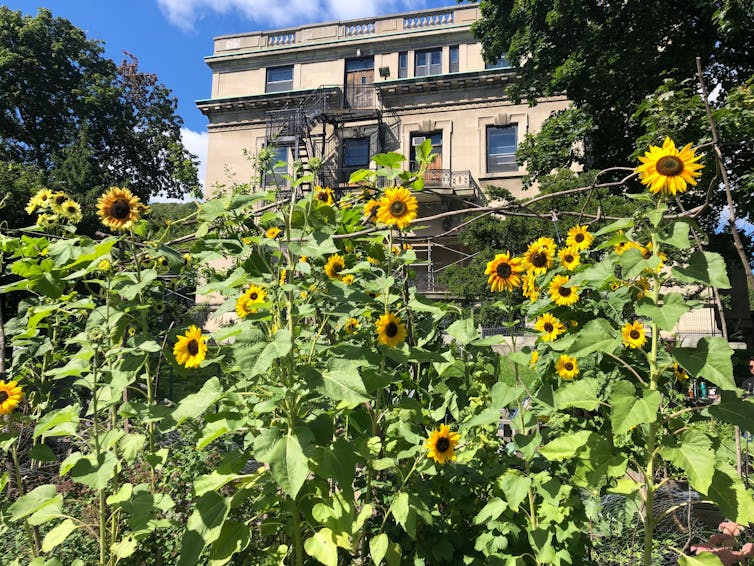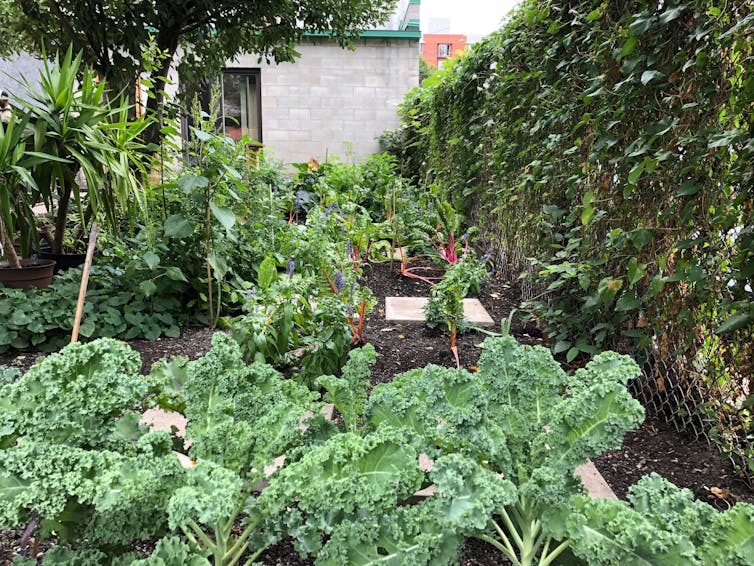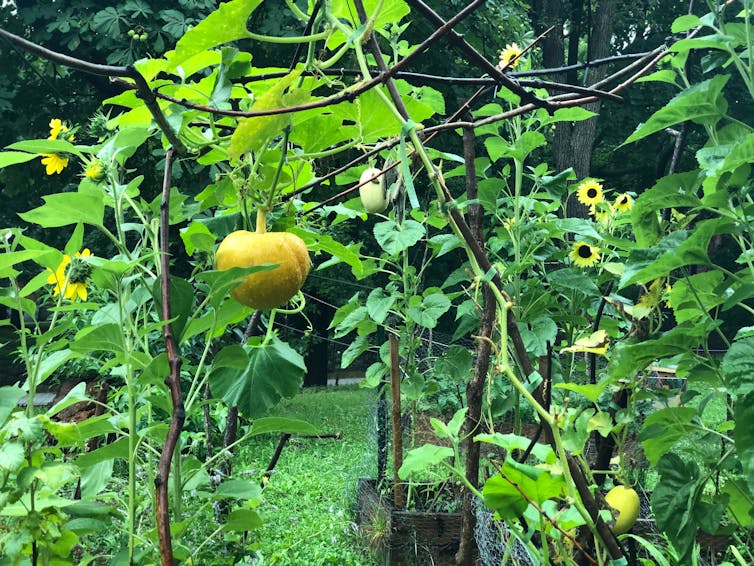[ad_1]
Whereas it is broadly understood that group and and school gardening have innumerable effectively being, well-being and educational benefits, it’s important to understand these benefits don’t magically appear when gardens take root.
Over the earlier six years, I’ve labored intently with educators, group workers, activists and group members in Tio’tia:ke/Montréal as we created, funded and sustained gardens and yard teams at schools and group organizations.
We prepare grownup education internships to supply smart gardening and instructing assist to find the extent to which gardens act as boards the place people deal with social and environmental justice. Some contributors expert obstacles to employment, meals insecurity and homelessness.
This evaluation and group work demonstrated how important it is to advocate for broader social, metropolis and educational structural modifications to assist group yard work — and to know the importance of getting life like expectations about what people can accomplish in and through gardens.
Who do benefits attain?
In Tio’tia:ke/Montréal, group gardening unfolds in many different methods by which may embody gardening efforts at community-based organizations and city-run gardens.
There are important wait lists to entry a yard plot throughout the metropolis, exacerbated by group gardens being historically additional accessible to property-owning folks.
Consistent with the mayor of Montréal, “for a lot of people, group gardens are better than solely a curiosity. They allow them to feed their households and to amass latest produce at a low worth.”
Such statements obscure additional superior factors spherical who controls and accesses group gardens and deeper entrenched social inequities referring to land rights in a capitalist settler-colonial society that privileges possession, whiteness and hierarchical modes of relating.

(Mitchell McLarnon), Creator provided (no reuse)
Relationship to meals insecurity
My findings contest claims that advocate group gardening is inherently an train that reduces under-served communities’ meals insecurity.
Reflecting on my efforts to develop meals for organizations that work with people experiencing meals insecurity, as part of a mission known as “Gardening for Meals Security,” I can’t declare gardening helped to alleviate the problems of people experiencing meals insecurity in any quantifiable method.
That’s no matter producing an immense amount of meals harvested on a weekly/bi-weekly basis from late June to early November in 2018 and 2019.
Although the gardens had been thriving, the group not at all lowered their meals order to Montréal’s largest meals monetary establishment. This may be on account of whereas contributors ate from the yard harvest, their reliance upon it did not cut back their need for various meals. The Gardening for Meals Security mission did, nonetheless, modestly assist a meals monetary establishment and a once-a-week meal service.

(Mitchell McLarnon), Creator provided (no reuse)
Mixed outcomes for communities, folks
As we gardened and invested in gardens for numerous social, tutorial and environmental causes in shortly gentrifying neighbourhoods, we contributed to rising land values in a course of described as inexperienced gentrification.
No matter these important observations, some benefits of the mission included:
- offering associated paid employment for youthful adults experiencing obstacles to employment, meals insecurity and homelessness;
- providing mentorship and alternate options for under-served youthful adults and school college students to particular themselves (by way of paintings, photographs, music, film, gardening);
- facilitating partnerships between schools and organizations with mandates of social and environmental justice for mutual revenue;
- shopping for prolonged financial, learning and human helpful useful resource assist to educators, learners, group workers and group members, whereas rising ethical relationships and collaborating to carry out shared targets.
The latter three varieties of benefits are powerful to quantify to funders.
Points with schools gardens
Gardening as part of environmental education is simply not compulsory core curriculum in Québec. College gardening normally occurs outdoor of formal class time, all through lunch hour or after school. Taken collectively, organizing gardening experiences for school youngsters inside most public schools offers additional labour to already overworked and under-supported educators.
For gardening to be associated and add tutorial price for every lecturers and learners, gardens should be included into each core curricular area (French, English, Math and so forth) and by no means solely used sooner than or after school hours and thru lunchtime.
Be taught additional:
College-community gardens plant the seeds of change to cope with world warming
A lot of my teacher collaborators acknowledged that they are completely devoted and excited by creating garden-based learning experiences for his or her school college students. Nonetheless securing permissions interprets to administrative labour. This might detract from arranging completely different important factors of yard creation like establishing funding, establishing relationships with collaborators or drawing curricular connections and so forth.

(Mitchell McLarnon), Creator provided (no reuse)
Small group change
Tio’tia:ke/Montréal, like many Canadian cities, has an prolonged winter and a short intense summer season season. For faculty gardens to work, the planning and administrative labour and permissions for a spring yard should happen early throughout the school 12 months to account for inevitable delays.
If educators or outdoor occasions wish to assist school gardens with funding and labour, I strongly counsel that school college students lead the creation, progress and importantly the evaluation of the yard as a mission.
When gardens are prematurely celebrated for producing anticipated outcomes equivalent to effectively being and well-being and meals security, with no larger acknowledgement of how these superior factors are affected by systemic obstacles, so much might be misplaced.
This accommodates the well-being of lecturers who make investments immense labour in a single factor they think about in with restricted institutional assist, and fairly priced areas for people to dwell who get dispossessed of their properties, communities and networks by way of inexperienced gentrification.
No simple choices
There are not any simple choices to the social and environmental points of college, group gardening or greening.
Usually, lecturers and group members want and need a yard, nonetheless they’re additional in need of: financial assist, instructing assist, human helpful useful resource assist, additional time, fewer school college students, curricular freedom, associated expert progress and land that isn’t part of a a lot larger capitalist system of non-public possession or tied up in pink tape.
Even small group change takes time and needs ongoing collective effort.
That’s an updated mannequin of a story initially printed Aug. 4, 2022. The earlier story talked about gardens had been reserved for property-owning folks in its place of additional accessible to them.
[ad_2]
